2023 Post-Election Roundtable
2023 Post-Election Roundtable
November 13, 2023
Video
Slides
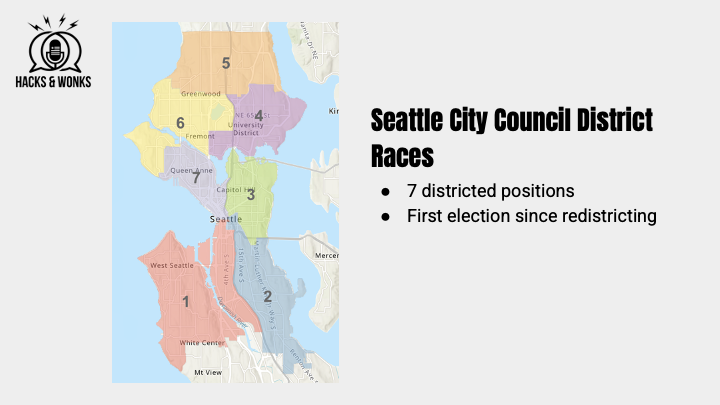
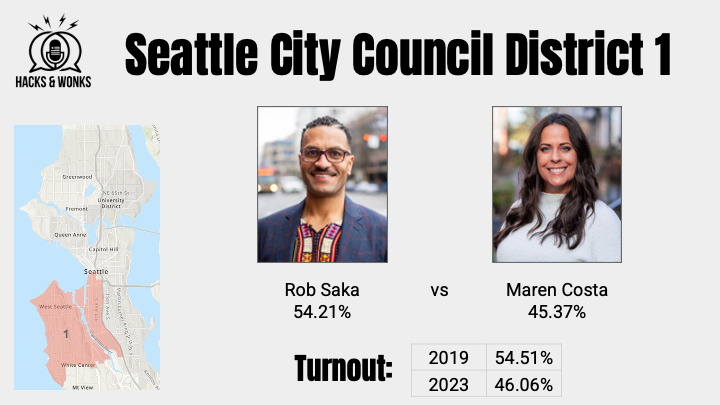
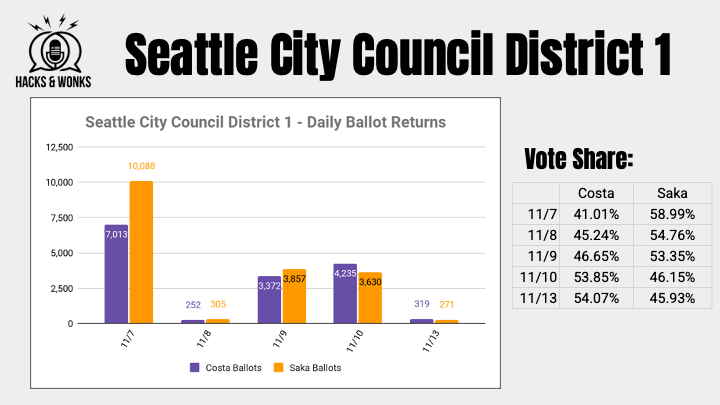
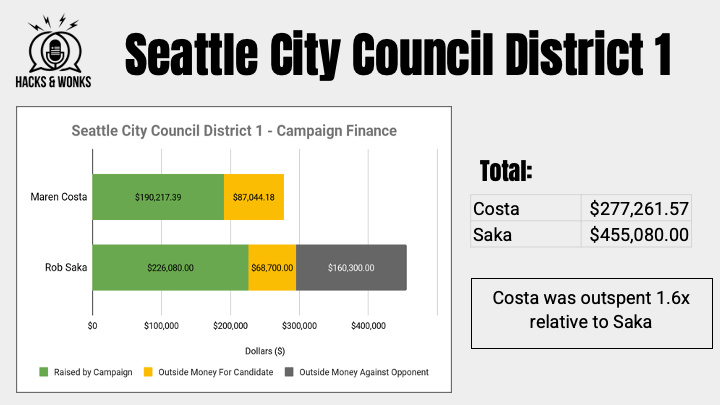
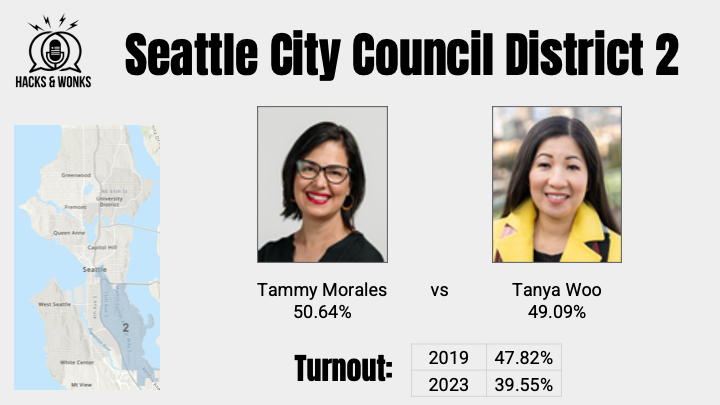
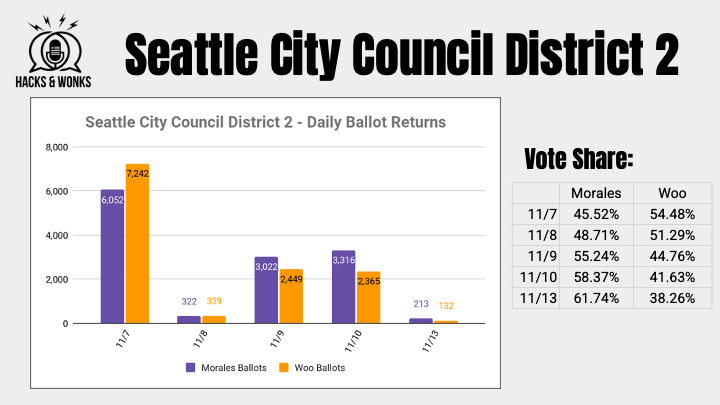
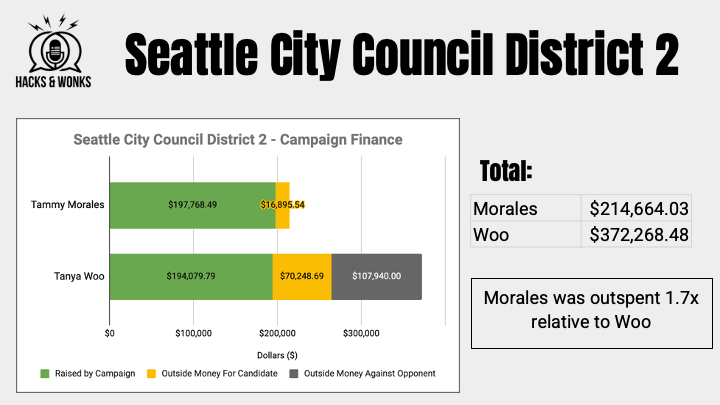
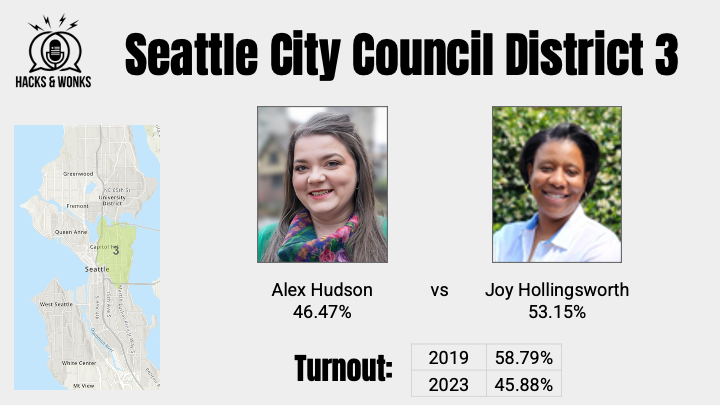
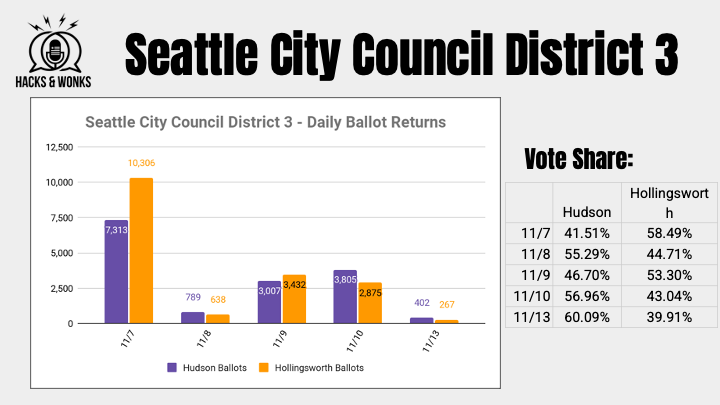
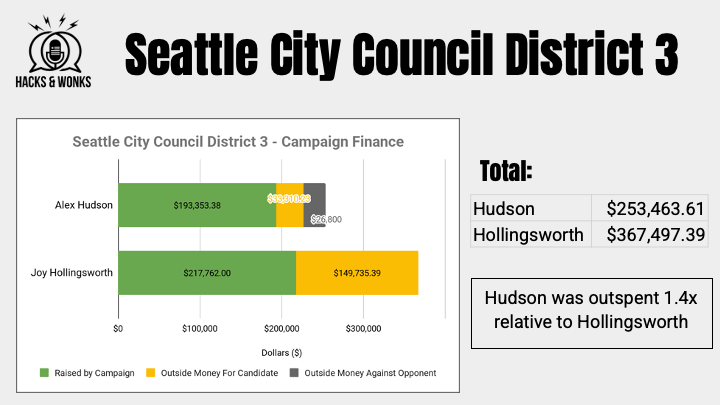
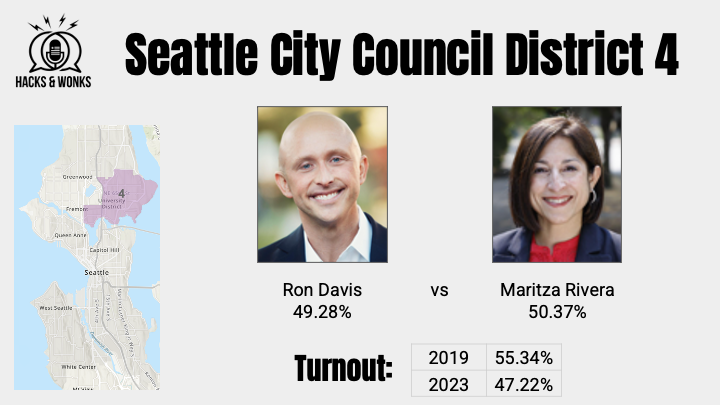
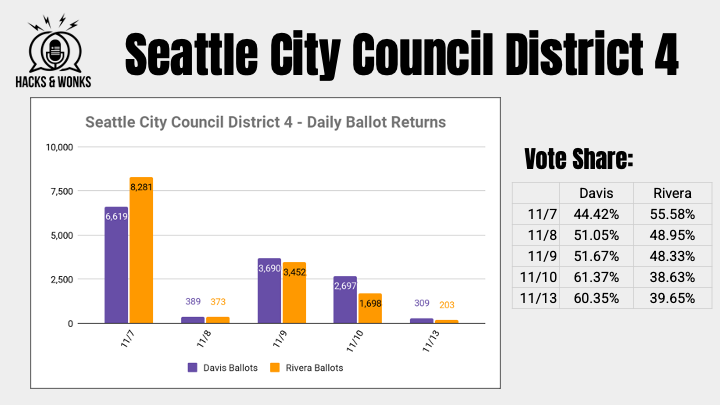
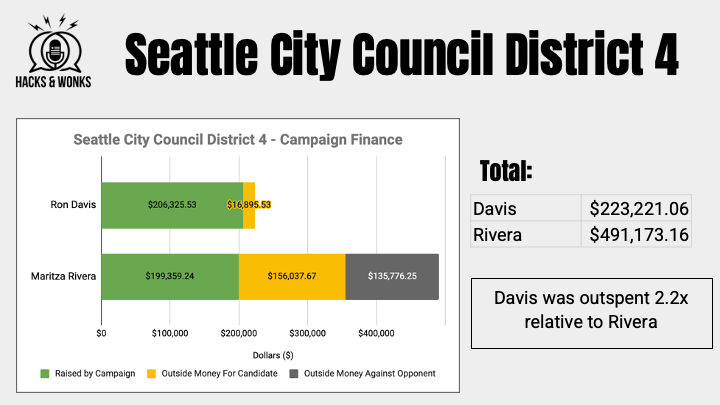
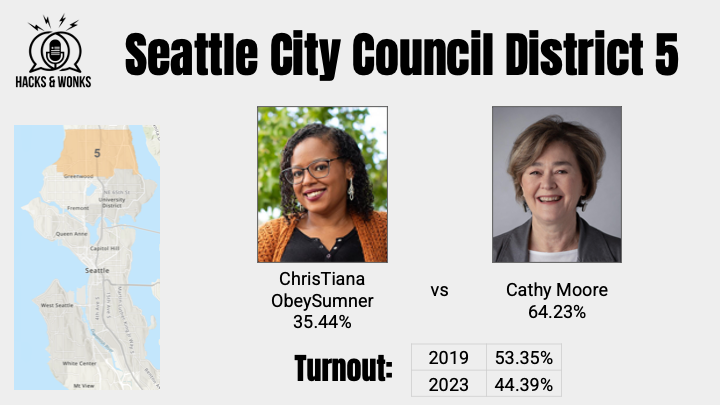
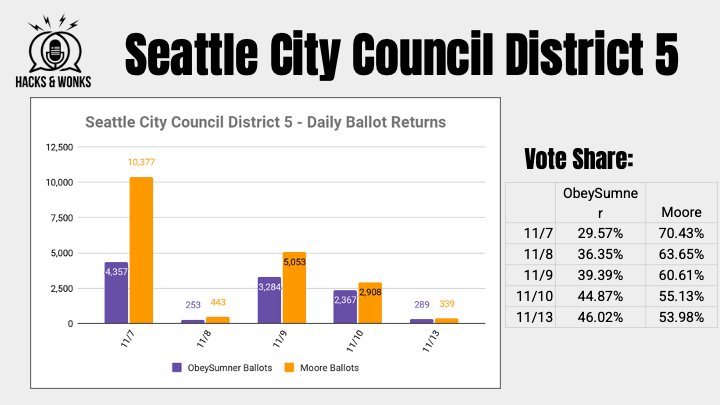
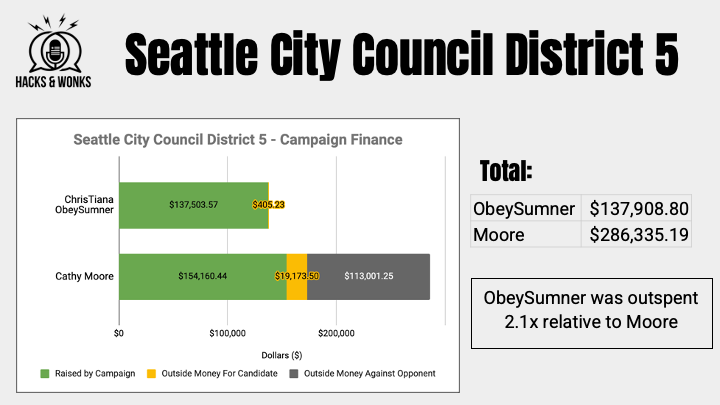
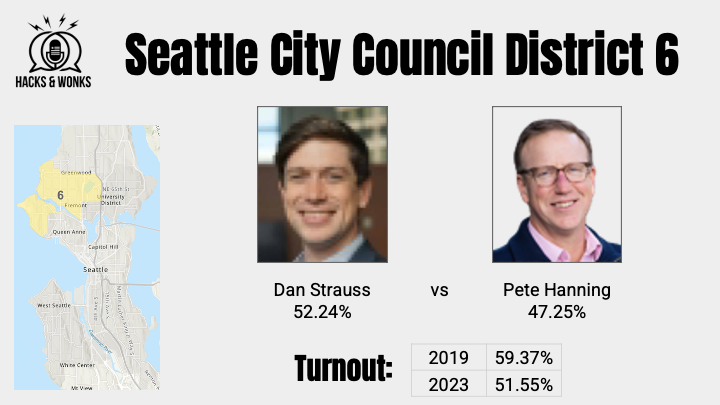
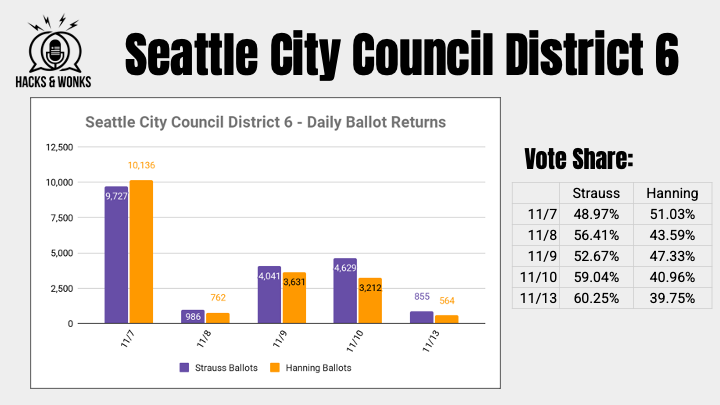
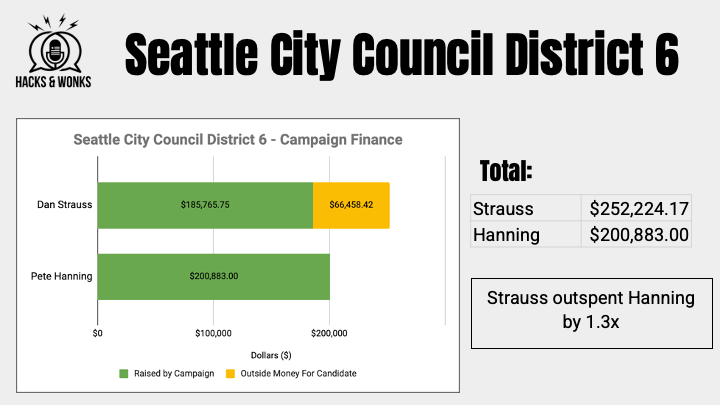
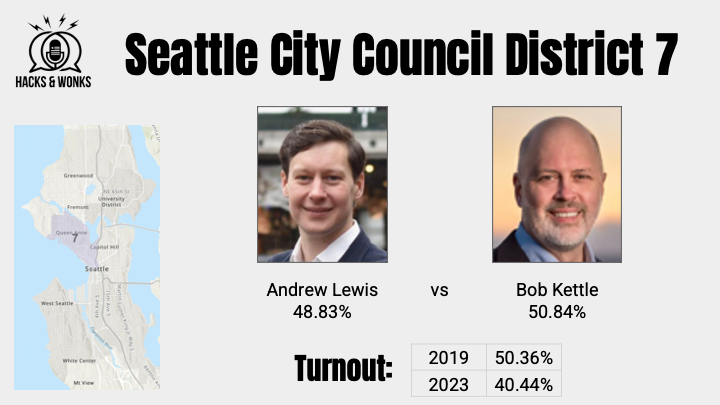
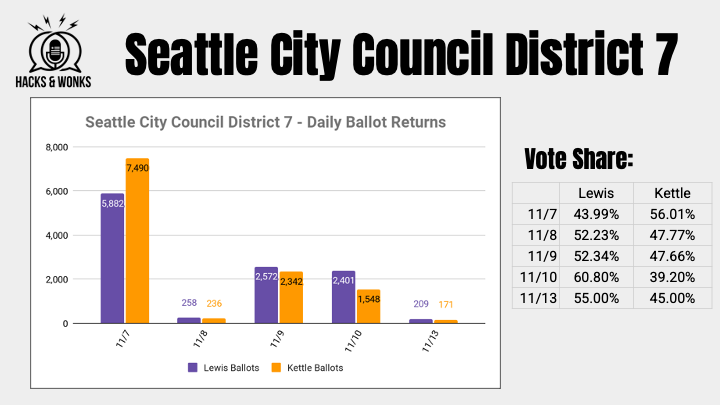
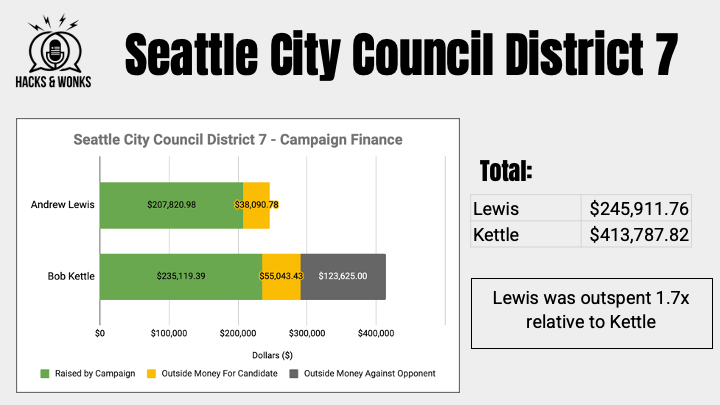
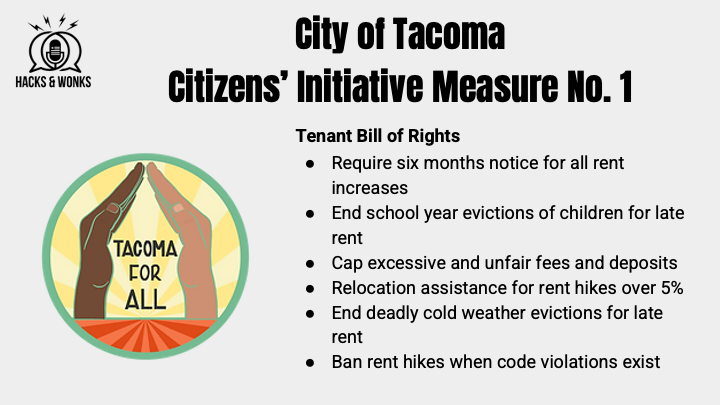
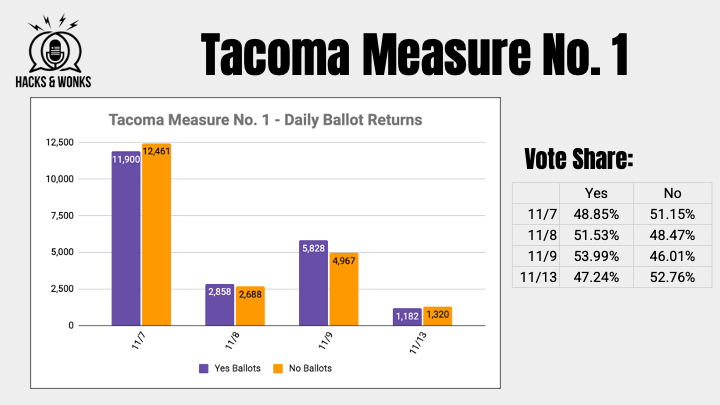
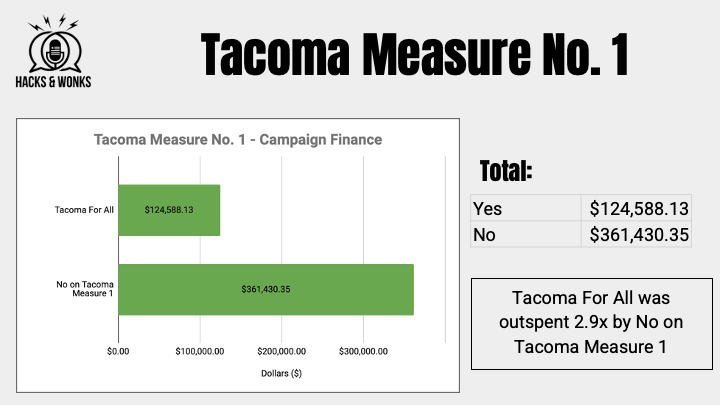

























Transcript
[00:00:00] Crystal Fincher: Good evening everyone, and welcome to the Hacks and Wonks Post-Election Roundtable. I'm Crystal Fincher, a political consultant and the host of the Hacks & Wonks radio show and podcast, and today I am thrilled to be joined by three of my favorite Hacks and Wonks to break down what happened in last week's general election in Washington.
We are excited to be able to live stream this roundtable on Twitter, Facebook and YouTube. Additionally, we're recording this roundtable for broadcast on KODX and KVRU radio, podcast, and it will be available with a full text transcript at officialhacksandwonks.com.
Our esteemed panelists for this evening are Katie Wilson. Katie is the general secretary of the Transit Riders Union and was the campaign coordinator for the wildly successful Raise the Wage Tukwila initiative last November. Andrew Villeneuve is the founder of the Northwest Progressive Institute and its sibling, Northwest Progressive Foundation. He has worked to advance progressive causes for over two decades as a strategist, speaker, author, and organizer. And Robert Cruickshank - Robert's the Director of Digital Strategy at California YIMBY and Chair of Sierra Club Seattle, a longtime communications and political strategist, and he was Senior Communications Advisor to Mayor Mike McGinn from 2011 to 2013. Welcome, everyone.
[00:01:28] Robert Cruickshank: Thanks for having us.
[00:01:30] Katie Wilson: Yeah, thanks, Crystal.
[00:01:30] Crystal Fincher: Well, absolutely. Let's start talking about the City of Seattle City Council races. There are quite a number of them - we'll break them down by district. So there were 7 districted positions. This was the first election since the latest redistricting process, so these districts are not exactly the same as they were the last time we had an election, so that may have played a little role - we'll talk a little about that later.
But going into Position 1 - as we see, Rob Saka currently holds a commanding lead and he will win the race for Seattle City Council District 1 with 54% of the vote to Maren Costa's 45% of the vote. Turnout in this election was 46%, compared to 2019's 54%. Quite a bit difference. Starting with Robert, what was your take on this race?
[00:02:34] Robert Cruickshank: You know, I have to say I was a little surprised at the margin of victory for Rob Saka here - for a couple reasons. One is that I thought Maren Costa ran what seemed to me to be a strong campaign that potentially would have resonated with a majority of voters, not just 45% of voters in West Seattle and in Georgetown-South Park.
But also Maren Costa got endorsed by all of the other candidates in the primary aside from Rob Saka. And one might have thought that that would have conferred added legitimacy and certainly support for the campaign. It does not seem to have turned out that way. One thing I think we'll certainly want to talk about tonight is the effect of lower turnout - did that wind up sinking progressive candidates or was it other factors?
But here you see the first of the seven districts - significantly lower turnout. Now if we had 2019 level turnout, would that have been enough to bring Maren Costa to victory? Hard to say. Maybe not. But this certainly is one where Maren Costa, who had a great record of standing up to Amazon - she was one of the two employees who was fired by Amazon for doing climate organizing, and then wound up getting a settlement as a result of that. I'd be interested to dive more deeply into what happened there.
But it's also - one thing I would keep in mind is West Seattle - voters there have been pretty cranky and upset ever since the pandemic began - because while for the rest of us in Seattle, pandemic 2020 meant lockdowns, it meant protests, it meant a lot of disruption. For West Seattle, it also meant being cut off from the rest of the city because the bridge went out. The bridge closed right around the time the lockdowns began due to safety concerns it might collapse. And having spent a little bit of time there in West Seattle lately and talking to voters out there - there is a strong sense of disconnection, of anger and frustration, at City Hall and it's possible that got taken out on Maren Costa, who's seen as a progressive candidate. There's definitely a narrative that the business community - and their wealthy PACs and Seattle Times - tried to tell to paint progressives as a kind of incumbents here. And it's entirely possible that that was another factor here too. But certainly worth looking at to see what happened in District 1.
[00:04:49] Crystal Fincher: Definitely. What do you think about this, Andrew?
Oh, you are currently muted.
[00:05:00] Andrew Villeneuve: I was surprised too. I think this was a result that not a lot of people maybe saw coming because if you look at the top two results, Maren had a significant lead - plurality lead, but a lead. You look at the difference - they are in two different brackets when you have - Maren Costa's up there in the 30s, Rob Saka's back there in the 20s. So I think a lot of people assumed in the general election that there was going to be a significant advantage for Maren Costa, especially having the support of all of these rivals who had not made it to the general election. But I think when you look at Rob Saka's message, I think we have to conclude that it did resonate with the voters in the district.
And I'm looking at his website and just checking out all of his enendorsements - and he emphasized he was endorsed by Seattle Mayor Bruce Harrell - I think that was a key endorsement that he got. I think the mayor is very popular - our organization does quite a bit of polling - some of Hacks & Wonks listeners may know. And in all of our polling this year we've seen the mayor is very popular with Seattle voters. And that includes District 3 voters, voters across the city - really he's popular all over the place. So having that endorsement and touting that as prominently as he did - I think that was a key factor. And then of course The Seattle Times - I think they have more pull in certain districts than others. And District 1, I think, is a district where I think that they have more pull than some of the other publications that endorsed in the race. I think The Stranger's endorsement matters more in District 3 than it does in District 1. And I think we saw the result of that here with this result.
And it could have been closer if there had been higher turnout. I have to agree with that as well. And the fact is right now we may see the lowest turnout in the history of the state of Washington in a general election. It's not clear yet if we're actually going to get to that worst turnout marker but we are certainly close. Currently I am looking to see how many ballots are left because the Secretary of State is saying - Well, we think the turnout is going to be somewhere between 36% and 39% - that's statewide. And if we don't surpass 37.10% then it is the worst turnout 'cause that was the low mark set in 2017. And as we can see, Seattle has higher turnout than the state as a whole, but it's lower than it has been in past odd years. This is part of a disturbing trend where we keep seeing turnout declining in odd-year elections - it is not going in a healthy direction, so that could definitely have an effect. If there is an opportunity later we can talk about even-year elections and what that could do for Seattle, but I'll leave it there and we'll continue to talk about the other races.
[00:07:39] Crystal Fincher: Definitely. What did you see? We will go over to this next slide here - looking at the role of independent expenditures in addition to campaign fundraising, did you see the role of money in this race being significant, Katie?
[00:07:59] Katie Wilson: Yeah, totally. I haven't actually studied in detail all of the slides you put together, but this is obviously telling that there is a pretty massive independent expenditure contributions here against Maren Costa. And you have to believe that that was a significant factor. I hope that maybe you, Crystal, or someone can speak to the relative weight of independent expenditures in the different City races because I haven't looked at that but I wonder to what extent that can help us to understand some of the results. But I think the spending against Maren was really significant.
I will say this was one of the races that also surprised me. Partly because whereas we saw in a couple of other districts some of the more progressive labor unions actually lined up with the more moderate candidate, in this race labor - maybe not 100%, but was pretty strong for Maren and so it also surprised me to see this margin.
The last thing I'll say, because I know we have a lot to get through, is that I'm really curious about what is so horrible about Rob Saka that all of his opponents in the primary came out for Maren, so perhaps we will get to learn that - maybe that's a silver lining.
[00:09:06] Crystal Fincher: Hopefully we learn he can rise above that given he is going to be a councilmember. It will certainly be interesting to see what his prime agenda is. He's certainly talked a lot about public safety, police - a lot of public safety talk involved with a lot of different issue areas. So it's going to be really interesting to see what his priorities are as he begins to govern.
I want to talk about Seattle City Council District 2. And this is one that saw a pretty tantalizing result - had us all on the edge of our seats. On Election Night, which is just a partial tally because we have vote by mail - those come in day after day, it takes us days to count them. We saw Tammy Morales overtake Tanya Woo after a few days of counting. This is a very, very close race. We can see here the breakdown of what the daily ballot returns were and how those changed over time. Robert, what did you see with this race, and why do you think Tammy was able to prevail when so many of the other progressive candidates were not?
[00:10:20] Robert Cruickshank: This is not the first time Tammy Morales has been in a very close election in District 2. She ran for the seat the first time in 2015 against then-incumbent councilmember Bruce Harrell and narrowly lost by roughly 400 votes. She did get, of course, elected in 2019 and now re-elected here in 2023. I think part of the story here is incumbency does help. I think the fact that Morales has worked really hard to show her voters that she delivers in southeast Seattle also goes a really long way. Obviously there was frustration among a lot of voters in the Chinatown International District area - that shows up in the results so far - Tanya Woo did very well there. But in other parts of District 2 - Columbia City and points south - Morales held her own and did well.
I think you've seen in the four years Morales has been in office, she's been a champion for workers, a champion for renters. She's fought very hard to tax Amazon, supported the JumpStart Tax. She's been very attentive to the needs of the district. When a number of people were struck and killed along MLK Boulevard there, Morales stepped up and met with people, fought hard and is continuing to fight hard at the City and with Sound Transit to make safety improvements. Morales is seen by a lot of people in southeast Seattle as someone who is attentive to the district, attentive to concerns, and responsive - along with being a progressive who's delivered results. So I think those are the things that insulated Tammy Morales from a more maybe conservative-moderate wave this year. Tanya Woo certainly ran, I think, a strong campaign - obviously a very close result. But I think a lesson here is that progressives who get in office and try very hard and very overtly to show their voters that they are working hard for them, that they share their values and are trying to deliver - that can go a really long way.
[00:12:22] Crystal Fincher: I definitely agree with that. How did you see this, Andrew?
[00:12:26] Andrew Villeneuve: I see Councilmember Morales as someone who is willing to do the work and that really matters. In a local campaign, doorbelling counts, organizing counts. I looked at Councilmember Morales' website while I was writing our election coverage last week and I was noticing how many of the pictures that she has are her with other people - and they're holding signs and look very excited. I look a lot at how do candidates present themselves and who do they surround themselves with. And there's something about these pictures that struck me as - it's not so conventional, it's very fresh. I thought that was a good image for her to put out to the electorate. This is a hard-working councilmember who's got a lot of supporters - a lot of grassroots support - focused on the needs of the neighborhood.
Incumbency matters, as Robert said. I was looking at her 2019 results as well. In 2019 she had 60.47% of the vote in that contest. And that was a sharp change from 2015 when she was facing off against Bruce Harrell and lost by only a few hundred votes. So I think that that big victory four years ago was helpful in setting the stage for this closer election this year where it was a tougher environment - the district's changed and of course you had an opponent who was well funded and trying to get the seat. And I think a more credible, perhaps a better opponent - someone The Seattle Times and others could really rally around more than Mark Solomon from four years ago. So I think that's what made the race closer.
But Councilmember Morales brought a lot of strength to this race, and you can see in the late ballots that that dominance was key. And that's why it's so important that that lead change occurred last week, because if Tammy was still behind this week it would be hard to pull it out. And we're seeing that in those other two races that we'll talk about later where things got really close but there's no lead change.
[00:14:17] Crystal Fincher: What was your evaluation of this race, Katie?
[00:14:20] Katie Wilson: I don't have a lot to add but I'll just say I think with a margin that small everything matters, right? And so, kudos to the folks who ran that campaign and who were out knocking on doors and making phone calls and sending texts - because with just a few hundred votes that makes a difference. Fewer than a thousand votes difference in that race would be looking more like the District 7 race and we'd all be singing a very different tune.
And I will just say - the implications of that race - Tammy being theon council again is going to be super important for social housing, for the success of Initiative 135, because she's really been kind of a champion of that on council and now will be able to continue that work - that was one of the things looking at the initial results that was running through my mind is - oh gosh, who's gonna carry the standard for social housing?
[00:15:20] Crystal Fincher: That's a great point. I also want to look at the spending in this race where Tanya Woo and independent expenditures in support of her and in opposition to Tammy Morales were substantial. And in this race, as in District 1 and a few others, we saw some very sharp and pointed criticisms coming through in mailers, in commercials. It was quite the direct voter messaging campaign. Do any of you think it went too far? Do you think it backfired at all? How did you evaluate that in this race?
[00:16:04] Robert Cruickshank: I don't know that it -- obviously it didn't succeed. But again I agree with Katie that in every close - super close election like this, every little bit makes a difference. I think it's clear that it certainly helped Tanya get to a very near victory. It's entirely possible though that it also may have backfired in some ways. I think that generally speaking, voters want to hear from candidates positive things about why you should elect them. They don't want to hear a candidate delivering negative hits. Someone else delivers the negative hits - it shouldn't be the candidate themselves. So it's entirely possible that Tanya Woo maybe put a ceiling on herself by going personally directly negative. But then again just a couple of shifts here and there and we're talking about a Tanya Woo victory.
[00:16:56] Crystal Fincher: Yeah, you raise a great point. In a race this close, everything matters. Been involved in close races before - you dissect every single little thing. Wonderful to be on the winning end, agonizing to be on the losing end of this - for the candidate and staff.
As we look to the District 3 race, this was an interesting race because we had one of the most notorious active incumbents in Kshama Sawant, who had gotten a lot of ire from The Seattle Times, from some of the TV news - were not a fan of her. She was a Socialist, not a Democrat, and pointed that out fairly frequently. Was a lightning rod but you can't say she didn't represent her district. She was reelected. She withstood a recall attempt but she decided not to run for reelection, so we had Alex Hudson and Joy Hollingsworth competing to be a new representative in this district. What do you think this race was about, and why do you think we got the result that we did? We'll start with Andrew.
[00:18:05] Andrew Villeneuve: So this is a race that we actually polled at NPI. We do as much polling as we can locally during odd numbered cycles, but it's tough because there's so many jurisdictions and some of them are too small to poll. But in this jurisdiction, there were enough voters that we could do a poll which was great. And in our poll we found a significant lead for Joy Hollingsworth. In the aggregate, which is a combination of a series of questions that we asked - Joy Hollingsworth got 52%, Alex Hudson got 28%, 16% said they were not sure, 3% didn't recall how they voted - that's the early voters, part of them. And 1% would not vote. So what we saw in the election was - of course, the late ballots have now come in - and what's interesting is Joy Hollingsworth's number is not very far off from the number she got in the poll. So basically it looks like the people who were planning to vote for Joy, or did vote for Joy already, did that. So they followed through - that's what they did. And it looks like Alex Hudson picked up most of the undecided voters and brought that race much closer. But Joy had this built-in lead that the poll showed was out there. Joy had done the work to build a majority coalition of voters in this election and our pollster did a good job modeling the election. They had to figure out who is going to turn out, and that's always a guess. They looked at 2019 turnout, 2017 turnout, 2021 turnout - tried to get a feel for who's that likely electorate going to be. And what we saw basically is the dynamic that was captured in the poll is what played out in the election. Joy had a majority and that majority was able to get Joy elected. Alex took the undecideds, the not sure folks, brought them in and made it a much closer race. But didn't do well enough in the late ballots to change the outcome, and that's despite District 3 being a very, very, very progressive district - a district that I think The Stranger has more influence in than other districts in the city.
So I think it's really great that we were able to take a look at this race. I wish we could have done all 7 districts. But we have a poll write-up where we talked about what we heard from voters because we actually asked them - Why are you backing this candidate? We did a follow-up question. It was a ground breaking thing for us in a local poll to ask the why behind the vote. And people told us that Joy is from the district. People said she grew up in Seattle, she's genuinely invested in the community, not everyone with a political science degree knows what's best. She has extensive experience across a lot of relevant areas - greatly focused on public safety, had the mayor's endorsement, long Central area presence. So those are some of the comments that we heard. People who were supporting Alex said that she was an urbanist, she had a better set of plans. There were some really positive things people said about her.
We didn't get a lot of negativity in the poll so people weren't really trashing the other candidate, but they were praising the one that they had decided to support. And I like to see that. I like to see that positive focus. So I think that's why we saw the result we did. Joy ran a really strong campaign, she connected with people. She was all over the place - I heard from District 3 voters saying, She doorbelled my home or she made herself accessible. I really liked that. And people just like to see someone from the Central District running for this council position. And my hat is off to Alex for putting together a great set of plans, running a strong campaign as well - it's just that in this election, Joy was her opponent and Joy was able to seal the deal with the voters.
[00:21:25] Crystal Fincher: How did you see this, Katie?
[00:21:29] Katie Wilson: I think Andrew gave a good rundown there. What I would have to add is this is one of those districts where some of the labor unions that you might think would line up with the person who is perceived as the more progressive candidate actually went for Joy. UFCW 3000 and Unite Here Local 8 both endorsed Joy and she got MLK Labor's endorsement. I think that probably mattered. I live in District 3 and I got in the mail an envelope, and when you open it there was a card from Unite Here Local 8 - pro-Joy. And so I think that for a lot of people who maybe are not in a hyperpolitical bubble, there was not a clear contrast between the two candidates in terms of who was the lefty pick and who was the more moderate pick. So yeah, I mean, and I think basically everything that Andrew said resonates with me as well.
[00:22:28] Crystal Fincher: Robert, do you think that the contract - or contrast or lack of a contrast played a role in this race?
[00:22:35] Robert Cruickshank: I absolutely do. I think there's an interesting column from Danny Westneat of all people in Seattle Times over the weekend, but what made it interesting is quoting a Seattle University professor who said he talked to his students and the students said - Yeah, they both seem progressive. They both seem pretty similar. And I think if you look at their campaign literature and their websites, that comes through. There's a longstanding strategy of a more moderate business-friendly candidate like Hollingsworth blurring those lines. I remember the 2013 election when Mike McGinn, the incumbent, narrowly lost to Ed Murray. And Murray ate into McGinn's base on Capitol Hill partly by blurring those lines. Jenny Durkan did a very similar strategy to Cary Moon in 2017. Blur the lines, make yourself seem progressive, make it seem like both are fine.
A couple other things stand out as well. The Washington Community Alliance puts together this great general elections dashboard. And I was looking at the results so far, precinct that we have - not complete results, but so far from 2023 in District 3 - and comparing it to what we saw there in 2019. And something stood out to me immediately, and Andrew alluded to this. On Capitol Hill itself, Alex Hudson did really well, so did Kshama Sawant. In the northern part of the district - North Capitol Hill, Montlake, and anywhere along the water, Leschi, Madrona - Egan Orion in 2019, and Joy Hollingsworth did well in those areas. In the Central District, Kshama Sawant put up 60, 65, 70% in those precincts. In 2023, Joy Hollingsworth won most of those Central District precincts. That seems to be where the battle for District 3 was won by Joy Hollingsworth and lost by Alex Hudson. So I think that's a big part of it. I think the fact that Hollingsworth is from the community, is herself a woman of color, I think that resonated really strongly there. I think that those factors meant Alex Hudson had a real hill to climb, literally and figuratively, getting up there in District 3. And I don't think Alex was able to do it. You know, we at the Sierra Club endorsed Alex, but we interviewed all the candidates, and they were all really strong candidates there.
I think ultimately, there's an interesting contrast with Sawant and Hudson that - I haven't figured out where I am on this, but it's interesting to think about. You know, Sawant won four elections in Seattle, the last three of which were in District 3 against huge corporate opposition. And one of the ways she prevailed was by mobilizing a strong base and by showing she delivers for her base. She delivers for workers, she delivers for renters - everybody knows that. And her base of activists from Socialist Alternative are out there aggressively getting votes. They did a great job of it. Unfortunately, Hudson is much more of a wonk candidate. She has extensive experience with housing and transit, knows local government inside and out. And when Sawant was in office, you'd hear a lot of progressives lament Sawant's approach, lament Sawant's attitude and style. And wish they had someone who was more of a wonk who'd work within City government - that's definitely Alex Hudson, but you gotta get elected. And what we see is that there's something to Sawant's approach - not that you have to agree with all of it - there's something to her approach to winning elections that I think progressives can learn from. And I think that - looking back, I think Hudson may have wished she could be more overtly progressive, especially when it comes to finding the things and finding the issues that motivate the base to show up. That's one of the only ways you would be able to overcome Hollingsworth's strength in that key battleground in the 3rd District, which is the Central District.
[00:26:21] Crystal Fincher: Yeah, I think you've hit on something there. And I think it's something that we see in the Tammy Morales race, that we've seen from Kshama Sawant - that if you are a progressive, playing it safe, trying to not be that progressive - not saying that these candidates were overtly trying to not be progressive. But you have to show that you're willing to fight and willing to deliver. You have to show that there's some basis to believe that not only are you talking the talk, but you can also walk it. And I think this race could have benefited for more of that on the progressive end. But it's gonna be interesting to see because Kshama was unique in many ways, but lots of lessons to learn from her just epic ground game that she had race after race.
And do have to hand it to Joy Hollingsworth, where I think - similar to Andrew and others - have heard anecdotally for quite some time that she has been out there knocking on doors, that she has been out there talking to community. And that is extremely important and only helps a candidate to be in contact with so many people in the community.
So going to District 4 - which this is a race that still isn't called, still is too close to call for a lot of people. What do you see happening here? And what do you think is this dynamic happening in this district, Robert?
[00:27:44] Robert Cruickshank: You know, I think this is another one where it is a very sharply divided district within itself, similar to District 3. You've got not just the U District - obviously is going to vote more progressive. So was most of Wallingford and areas around Roosevelt and even parts of Ravenna. But then once you get further north and further east towards the water, you get a bit more moderate, even more conservative. And once you're of course out in like Laurelhurst or Windermere, you're among the wealthy class. But Davis fought hard, fought very closely - nearly won. I don't know that there are enough remaining ballots as of here on Monday night to give Davis enough room to make that 300 vote gain that he needs. But he fought really close and really hard against a huge mountain of corporate money. This is one where I really have to wonder - if we saw 2019 levels of turnout, would we see a Davis victory? The results certainly suggest, especially as the later ballots came in, that might well be the case.
Davis ran, I thought, what was a very strong campaign, certainly one that connected with a lot of people in the district. But so did Rivera. And I think this is a interesting test case for how did sort of The Seattle Times-Chamber of Commerce narrative play out? Was Davis able to really overcome that and tell his own narrative of where we should go in Seattle? It certainly seems like in a lot of these races, any progressive candidate faced a lot of headwinds from just a constant narrative that the city is unsafe, city's on the wrong track, it's the fault of progressives and the city council, we have to make a change. And that drumbeat was really loud and really constant. And as you see here on the slide, Davis was outspent significantly greater - nearly half a million dollars spent against him to defeat him by putting out that message. How do you overcome that? You've gotta try to build a base, you've gotta try to actually get out there and sell a strong progressive agenda. I think Davis did as much as he could, but it clearly wasn't enough.
This is one race where, gosh, I would love to be able to see good polling after the fact and take a deep dive into what happened here. Because I think if you wanna find a candidate who isn't an incumbent, is a progressive, and who tried to win against all this money - Davis ran what I think a lot of us would have considered to be a smart campaign. But I'm sure there are things that were missed, mistakes were made - that I think are worth taking a closer look at once we have more data.
[00:30:22] Crystal Fincher: Do you think it was possible to win this race given the headwinds, Katie?
[00:30:27] Katie Wilson: Well, I mean, with a margin that small, you have to say yes. I mean, again, small things matter. But I mean, I guess I think what I would say here - and this is not really just about this race, but as we're going through these races district by district and picking out the little things about the candidates or the spending or whatever - I think it is important to keep in mind something that Robert alluded to, which is turnout. And Danny Westneat had this piece, which Robert mentioned, that really just laid out kind of like - not only is turnout way down from 2019, like double digits down, but it's young voters who didn't turn out. And I really have to think, I mean, I think that like if we had seen 2019 levels of turnout with that demography, this race would have turned out differently. I think it's even possible that Districts 1 and 3 could have turned out differently. I mean, the difference is so great in turnout and in who voted. And that is not just a Seattle thing. That's not a, so I mean, that was something that Westneat seemed to kind of emphasize the "Sawant effect" or something, but this is bigger than Seattle, right? This is like countywide, statewide - you look at the turnout numbers and turnout across the state is way, way lower than 2019. And it is young voters who would have voted strongly progressive who didn't turn out. So I think that's just a really significant thing to keep in mind as we kind of nitpick all of these races.
Sorry, crying baby.
[00:31:50] Crystal Fincher: We're doing baby duty and that happens and we're fine. Andrew, what did you think?
[00:31:56] Andrew Villeneuve: Yeah, some great things have been said by Robert and Katie about this race. I was so impressed with Ron Davis as a candidate. I just found him extremely thoughtful. I'm like - why can't we have candidates like this in every city? Maritza Rivera also had some really interesting things in her campaign that I liked. But I think what was really striking for me is Rivera, if you go on her endorsements page, you'll see Bob Ferguson is the very first endorsement listed there. And that's really interesting. And not everyone can get an endorsement from Bob Ferguson. Maritza Rivera had one and made sure that people knew that she had that endorsement. Also, you see Mayor Harrell's endorsement there. The mayor's doing well in this election. His candidates are doing well, and I don't think that's a coincidence.
And I also noticed Sara Nelson's endorsement there. Sara Nelson gets a lot of flak from folks in Seattle, especially on the left, perhaps deservedly so for some of the positions she's taking. But in our polling, she's actually got a pretty good approval rating relative to other members of the council. I say relative because these things are relative. So Sara Nelson is perceived better right now than other members of the council - and that includes Councilmember Sawant, who's leaving her district with a horrible, awful job performance rating, including from her own constituents. It's not just citywide. Our polling was very, very clear on that. People are not happy with her job performance. So she was able to get elected several times, she built an amazing coalition. But then that support has eroded away. And I think that's why she didn't seek re-election. I think she realized she was going to have some difficulty getting re-elected if she sought re-election. So exiting allows to avoid a defeat, which I think is a good strategy, because then you can go and take your experience in elected office and do something else.
But I just thought Davis had a tremendous set of ideas. He engaged with groups that other candidates didn't, from what I heard. And what I really liked was, again, he had this thoughtful, urbanist-centered vision. It really appealed to me personally. If I was in District 4, I'd be like - wow, this is just really exciting vision for Seattle. And his voters' pamphlet statement just talked about how everyone deserves a home in Seattle. And the themes that I saw there were very powerful. And I'm a little surprised that he didn't quite have a stronger Election Night performance. I thought Rivera might lead, but to see him down by as much as he was, that wasn't quite what I thought we might see. And I don't do predictions, so I'm always willing to be open-minded and see what happens. But I was thinking that the race would be closer on Election Night, and then it would be possible for there to be a lead change by the end of the week if that were the case. But instead, Maritza Rivera has kept a lead throughout this count. So I think, unfortunately, Ron Davis is out of runway to turn this around. But he came really close. And I think he should definitely run for office again.
[00:34:48] Crystal Fincher: Yeah, a lot of great ideas that we heard. Go ahead, Katie.
[00:34:51] Katie Wilson: Sorry, just to add one thing to what I was saying before from the Westneat column. This is roughly 40,000 fewer Seattleites showed up for this election than in 2019. So if you look at that, we're talking about an average of 5,700 votes in each district that would have been added. And so you look at these margins, and that would have shifted several of these races.
[00:35:13] Crystal Fincher: Yeah, I agree. And then I also-- I'm looking at this difference in spending. And the spending isn't just money. It's communication. It's the commercials that you see, it's the mailers that you get, it's the digital ads that you see. And those do move some voters. Are they going to close a 25-point deficit? No. But can they move a race 5, 10 points? Absolutely. And so as I'm looking at this, I'm looking at just how close this race is. And it seems to me that money definitely impacted this race, as did turnout, as did so many other things. But it just seems really hard to be able to go up against that amount of communication when you don't have it - to be outspent, to be out-communicated by that degree. And given that, I do think Ron Davis mounted a really, really good campaign for hopefully his first campaign and not his last, because he did contribute a lot of great policy ideas, concrete policy ideas, that I think would do the city good.
Moving to District 5, where we saw ChrisTiana ObeySumner versus Cathy Moore. This race was pretty conclusive as of the first tally on Election Night. What was your evaluation of this, Andrew?
[00:36:37] Andrew Villeneuve: Well, this was the one race I think that everyone could say - That's done - on Election Night. That's a done race. We can see where things are going. And of course, there has been a shift in the late ballots, but not enough of one to threaten Cathy Moore's position. So I guess what we saw is Cathy Moore had a campaign of enormous strength, resonated with the electorate. And we just didn't see the same from the other side. I mean, I know The Stranger made a very powerful case. But you look at the top two field, and there were other candidates - Nilu Jenks was running and didn't quite make it. But I feel like the fact that there wasn't a stronger vote for ObeySumner in the top two, that sort of set up the general election. I think you want to have as much support as you can get in the top two. And then you want to be able to run as strong of a general election campaign as you can. And I think that here, there might not have quite been the same resonance with the electorate for that candidacy. And I think that that's part of the issue - when you are having trouble connecting with voters for whatever reason, then you're going to see that kind of lopsided results.
And sometimes there's nothing you can do about it because for whatever reason, you're just not clicking. But I heard from a lot of folks who-- I asked every District 5 voter, who are you voting for? And everybody basically told me Cathy Moore - that I talked to. And I ran out of people to ask to see if I could find any ObeySumner voters. But to me, that sort of spoke for people had talked to their neighbors, they had considered their choices, and they settled on Moore. And so that's where we were on Election Night. And of course, again, late ballots - we saw some change, but not a whole lot of change. And so again, I think hats off to Cathy Moore for running a campaign that brought together a lot of people, excited a lot of folks. And we'll see now how Cathy does on the council as Debora Juarez's successor.
[00:38:42] Crystal Fincher: And Robert?
[00:38:43] Robert Cruickshank: Yeah, I'm a District 5 resident - voted for ChrisTiana, but have had many conversations with Cathy Moore. And Cathy Moore is definitely not easy to pigeonhole as a corporate moderate. Cathy has, I think, some pretty strong progressive background and positions. This is an interesting district up here in District 5 too, that - people assume it's so far north that we're almost suburbs, and that's kind of true. But there are also large pockets of immigrant populations, people of color, low-income folks. And if you look at the map so far of the precincts - votes that have come in so far - ChrisTiana, they've only won a single precinct in Pinehurst, but they're pretty close in areas like Licton Springs, north Greenwood, Lake City. They're almost neck and neck with Cathy Moore in some of those areas - these are some of the denser parts of the district as well. Again, I don't think anyone's surprised that Cathy Moore prevailed by a fairly wide margin here. Again, given what Andrew pointed out in the primary, that that seemed foretold there.
But I just wanna emphasize that Cathy Moore did not run the same race that maybe Rob Saka or Maritza Rivera or Bob Kettle or Pete Hanning ran. And I think that certainly helped. It's a district that four years ago, handily reelected Deborah Juarez over Ann Davison, who's of course now our city attorney. Which suggests that in District 5, there's definitely a lot of support for a left of center, but not too far left of center candidate. Well, again, we'll see what Cathy Moore does on the council. I think Cathy also ran a campaign that was good, but also kind of promises a lot of things to a lot of people. And the rubber will meet the road in the next few months on the council, especially as some important decisions come up around budget, around police contract, and around transportation levy.
[00:40:45] Crystal Fincher: Now, moving on to District 6 - this is where we saw incumbent Councilmember Dan Strauss wind up overtaking and winning the race over Pete Hanning. How did you see this race, Andrew?
[00:41:00] Andrew Villeneuve: So this was a race where we saw our first lead change, and Councilmember Strauss was fortunate in that he had the advantage of incumbency. He also, I think, had a district that perhaps, he felt like - okay, I can handle this redistricting, like I can handle some adjustments to the lines. I think he was well-prepared to face a slightly different electorate than what he faced in his last campaign. And he also was mindful of his public safety posture as he went into the campaign, realizing that - we're gonna talk about District 7 next - but realizing that it's important for people to perceive you on public safety as being someone that understands the issues that are out there in the community, which we know are significant. We know some people are concerned about property crime. We know some small business owners are very vocal about the issues they're going through, they're looking for more help from the city. And I think Councilmember Strauss was ready for that dynamic.
I also think he made an effort to present himself as someone who's gotten things done. And he got not the most enthusiastic endorsement from The Stranger, but it didn't seem to hurt him too much. I mean, they sort of riffed on his "Ballard Dan" moniker. I went to his website and was reading about how he presented himself, and he's talking in his campaign bio about non-political things. And I think that's a really interesting and smart choice is to show yourself as not just a politician, but also a fellow community member, someone who has different interests. You're not just interested in politics - that's not the only thing you care about. And I think that that helped him connect with voters. I think it's very important for people to see who you are - that helps them identify with you. It's very important that people identify with you when they go to vote, because elections tend to turn on identity and trust more than anything else.
Issues do matter, of course. And those of us who are very much in the wonkish space, we love people's issues, positions - we love to evaluate them. But I think a lot of voters are more in the mindset of - Do I want this person representing me in government? And they think about it at a very basic level. They don't think necessarily about people's issue positions. And they certainly don't have an Excel spreadsheet where they run a calculator to see whose position they're closest to. So I think that was one of the key things that I saw here was just, again, Strauss presenting himself as someone that folks could identify with and empathize with.
And I also think Pete Hanning could have run a stronger campaign here - not as much resources on Hanning's side as I thought we might've seen, and that could have been a difference maker. Again, in a close race with a lead change, it's like just what we were talking about earlier - anything can make the difference. So we could talk about a lot of different factors, but what I saw was an incumbent who was interested in getting reelected and put in some of the work. And made sure that there were reasons for people to identify with him. And I think that we saw that worked out for him, and he was the first of the two incumbents to get that lead change on Thursday. So congratulations, Councilmember Strauss, on your reelection.
[00:44:03] Crystal Fincher: How did you see this, Katie?
[00:44:07] Katie Wilson: Yeah, I don't - sorry, I'm a little bit distracted. But yeah, I mean, I think that Councilmember Strauss definitely did somewhat of a pivot to the right, or just trying to kind of blow with the winds of his district and that paid off. And yeah, I'll pass it on to Robert.
[00:44:28] Robert Cruickshank: Yeah, I think a couple of things stand out. Certainly the slide that's being displayed right now - notice there's no independent expenditure against Dan Strauss. Strauss clearly cozied up to the Chamber here, he cozied up to Mayor Harrell. So his blowing with the wind, which I think is an apt description, worked. It also worked when Dan put out mailers saying, I voted against defunding the police. Dan has been very active in trying to get encampments cleared at Ballard Commons Park and other areas in the neighborhood. So I think we who are progressive - who don't want to see a renewal of the War on Drugs, we don't feel comfortable when we see sweeps happening, we're not totally comfortable with this current mayor - have to do some reflection here. And the fact that Strauss took these positions that we who are progressive don't really like and prevailed with it - isn't great for us. And I think we've got to be honest about that and reflect on what that might mean, and how we pivot, and how we handle things differently. It doesn't mean we should abandon our core values. You never do that in politics, otherwise we should go home. But I think we got to take a look at this race and see why.
Now, a couple other factors I want to point out. Again, Strauss is a incumbent and that helps. Also his district is fairly favorable. I think there's sometimes a reputation that like Ballard gets as being a bunch of cranky, conservative Scandinavians and it's just not. If you have a view of the water in District 6, you voted for Hanning. If you don't, you probably voted for Strauss - and that goes as far up as North Beach, North of 85th Street, which is pretty well off, parts of Crown Hill, pretty well off, lots of homeowners in Phinney Ridge and Greenwood, Ballard and Fremont all voting for Dan Strauss by pretty healthy margins. So I think the fact that that district - one that reelected Mike O'Brien in 2015, and I think would have reelected him in 2019 had O'Brien had the stomach for it - it is a favorable one. I think there's more opportunity there then Strauss was able to really make out of it. But again, this is a race where, press as we can point to things that didn't go our way, we didn't get the turnout we wanted, we had a lot of money spent against us, but someone like Dan Strauss who sort of blew with the wind, decided which way the wind was blowing, moved away from a lot of our positions and prevailed. So we have to be honest about that.
[00:46:53] Crystal Fincher: Yeah, this race I thought was interesting because he did run away from his record basically and try to correct for that. It's really interesting because we saw two different approaches from two incumbents who both wound up successful. Tammy Morales, who is probably now the most progressive member remaining on the council - one of the most progressive before - showed that she was engaged and she did care. And I think maybe the key is really that - there has been this prevailing idea that progressives just don't care about crime or they wanna go easy on it. And one thing I think both Dan Strauss and Tammy Morales did was show that they cared very deeply and they were willing to stay engaged, stay involved, try and push through public safety, community safety initiatives that both of their districts had been calling for. And being engaged is what helped them. And really showing that they care and showing that they're working on the problem is what helped them - both of them - in those races, even though they have taken very different approaches and Tammy Morales stood by her record, fought hard for the district and a number of different things. So that was interesting for me to see - just the different approaches - but both looking like they were successful as long as they were engaged.
We'll transition to District 7, which we saw the third incumbent running for Seattle City Council, who - this is a very, very close race still, but it looks like Andrew Lewis may have run out of runway to come back in this race. What was your view of this, Robert?
[00:48:40] Robert Cruickshank: Yeah, I mean, Andrew Lewis won a close election in 2019 and he appears to have lost a close election here in 2023. I know that there is - we'll see the spending slide in a moment, but there's more spending certainly against him than his colleague Dan Strauss saw. I think that looking at the map - and there it is, I mean, it's almost 2:1. Similar to Davis, Andrew Lewis got nearly half a million dollars spent against him.
If you look at the precinct map so far and compare it to 2019 - in 2019, Andrew Lewis held his own on Queen Anne, on the top of Queen Anne - that sort of island up in the sky of privilege and prosperity. Andrew did pretty well, won a bare majority in Queen Anne, just like he won in the district as a whole. If you look at the map from 2023, Queen Anne almost uniformly going to Bob Kettle. Now again, not all ballots are in, but I think you see - another thing that stood out to me is downtown. Downtown Seattle, Belltown - a lot of renters, also a lot of condo owners - that also seems to have gone to Bob Kettle. So I think that the narrative about public safety probably tripped up Andrew Lewis here.
And I think Andrew Lewis - he voted against the drug ordinance in June when it first came up, but I think that was the right thing to do from a policy perspective. And then he wound up voting for it after working out a deal with the mayor's office to improve the ordinance. Voters may not have liked that, and certainly Bob Kettle ran pretty hard against that - putting out campaign messaging saying that Lewis was waffling, which is never a thing you wanna have said about you. I think that this is one where Strauss made the pivot that Lewis didn't really wanna make. And I think we, again, as progressives, gotta look at this and think - Lewis stood where we wanted him to stand, especially in that vote in June. And I think figuring out how to support candidates when they do things like that is going to be really important.
This is another one obviously where turnout was different - a significant drop-off of turnout from 50% turnout in 2019 to 40% turnout in 2023. Again, you don't need much shift in turnout - especially if it comes among younger voters, renters, people living in dense communities - giving the victory, potentially to Lewis had they shown up. So this is where I feel like we can talk about Lewis - what Lewis should have done. I also look at the progressive movement as a whole and think - what did we all need to do differently in this election? I think finding ways to really fight for someone like Lewis, who's with us on most things, and certainly took up what I thought was a courageous vote in June - We've gotta reflect on that and think how we do better next time in these types of close races.
[00:51:33] Crystal Fincher: What did you think, Andrew?
[00:51:35] Andrew Villeneuve: Well, I think District 7 is the most conservative of the seven districts. And so the deck was kind of stacked against Andrew Lewis to start out with. And then as Robert said, the public safety piece was kind of big here. How much did voters see and hear about why Andrew Lewis was taking the votes and the actions that he did? Because for those of us who follow politics closely, we are interested in what happens at council, we're interested in the votes, and we pay an inordinate amount of attention and consume a lot more information. We might've been able to follow what Andrew Lewis was saying a lot more easily about why he voted the way he did in June, and then what he did in the fall - the late summer and fall - that caused him to take a vote that many people might've thought was contradictory to the vote that he took in June. And so I'm not sure how many voters were able to follow what was happening there. And it might've looked like, to use the old political cliche, flip-flopping. And if that's the case, if that's how voters perceived that, that could have been a negative. And Bob Kettle certainly being able to capitalize on that - that could be a very powerful thing if people are already feeling a little unhappy, disenchanted.
We saw at the beginning of this year - we did a citywide poll right before the election that was for the initiative, the social housing initiative - we had the special election, we did a poll before that. And pretty much everyone in the council got a negative job performance rating, except for Sara Nelson, who had a slightly positive one. And I looked at that and went - Hmm - 'cause we weren't just assessing, how do you feel about the council as an institution? 'Cause that's a separate question. It's possible to like your member of the institution and dislike the institution - we see that dynamic with Congress. But here, people actually - we had in the poll, we had people rate each councilmember and the ratings were not good for most of the incumbent councilmembers. Sara Nelson being the exception, as I mentioned. So people were already unhappy, and then you take this public safety dynamic and this confusing position-taking that is going on, I think for many voters, and it becomes something that leaves you feeling not confident about voting for the incumbent.
And I know Andrew Lewis worked really hard. I know he did a lot of door knocking, that I think they did try to leave it all out there in the field. But when you put together the low turnout, the money that was spent against Andrew Lewis, you put in the fact that it's a very conservative district out of the seven to start with, then you have the recipe for a Bob Kettle victory. Bob Kettle had a lot working for him. I don't think he ran the strongest campaign we've ever seen in Seattle city elections history. I think he just was lucky. He was a beneficiary of circumstances. So I'm gonna miss Andrew Lewis on the council - One of our board members is on his staff and I just think he brought a lot to the council. And I hope he runs for something else or stays involved in politics because I appreciate his vision.
[00:54:39] Crystal Fincher: Yeah, I do appreciate his vision. And I think you're onto something with the confusing. It's confusing to be able to explain that, and I think that wasn't the only set of confusing votes that he took. There was a notable one last year, early this year - time doesn't mean much to me anymore - that he took there, and while that does happen and while there are certainly justifications, that's a hard thing to explain. And when you do, you better be clear and hope it cuts through to the voters. And I think that's a really hard thing to do for the general public, particularly when you have hundreds of thousands of dollars painting some of your votes in a different light. We saw in one of those ads with Bob Kettle - Sara Nelson blaming deaths on Andrew Lewis, which I think was disingenuous. But it just showed the amount of spending, the type of rhetoric that was in this race and that they really felt he was vulnerable on public safety and they certainly took advantage of that.
I wanna shift a little bit and talk about what this means moving forward for the city of Seattle. What does this council mean for the city? I wanna start with Katie. What are we likely to see?
[00:56:02] Katie Wilson: [baby crying] Can you come back to me?
[00:56:04] Crystal Fincher: I sure can. We'll start with Robert.
[00:56:07] Robert Cruickshank: Yeah. I share the baby's thoughts on this. It's not good, folks. I think what this election will have done is turn the 2020s into a lost decade for Seattle. I think we're going to spend the next four years until 2028, when a new council is inaugurated, playing defense. I think it's going to be very difficult to advance new policies, especially around housing, transportation, and climate. I think that especially for the next year or so, some of the most regressive forces in the city are going to feel emboldened. People who don't want new housing, people who want a transportation policy centered around cars and nothing else are gonna feel really like the wind is in their backs and they can really push harder than they might otherwise have pushed. I think there's going to be big fights over a comprehensive plan that's supposed to be approved next year. And this incoming council may not be as friendly to dense urban housing that we need to tackle the climate crisis and the affordability crisis as some of the other candidates would have been. We have to renew a transportation levy next year. Is that going to be focusing on a new sustainable transportation plan that focuses on transit, people who walk, people who bike, or is it gonna be tripling down on cars? Those are some of the things that come to mind.
The fight over JumpStart and taxing corporations is going to be significant. It's quite possible that this election turns out to foretell a significant decline in the quality of life in Seattle - if we see budget cuts to major public services, to libraries, parks, and certainly human services, I'd worry a lot about that. It's also possible that we don't see an incoming council that's really focused on building enough housing, especially affordable housing, and transportation options to make it easier for people to live and work here - that we become even more polarized into a city of the very rich and the very poor.
So I think we gotta be clear right here as progressives. The messaging we had on public safety, on homelessness wasn't working. Again, I don't think we should throw out our core values, but we've got a lot to learn from here. And the messaging that does work for us - housing, that people want people to fight for their rights as renters, wanna fight for affordability - we didn't do enough of that, I don't think. And finally, we need to figure out what pulls our people out to the polls. Do we need to start running ballot initiatives at the same time as mayoral elections, as city council elections in November? I think we should very seriously start considering that. But we're in for four years of playing a lot of defense and we're gonna lose a decade when we really can't afford to lose it to tackle affordability, racial justice, police reform and climate.
[00:58:48] Crystal Fincher: What are your thoughts, Andrew?
[00:58:50] Andrew Villeneuve: Well, I like to be hopeful and optimistic about the future. And I think that there's an opportunity to persuade the council to be progressive. And I think that we can see a lot of great things happen with this council if people put in the work to create the relationships and to connect with folks - I'm someone who believes you create the future you wanna see. And I'm not a huge fan of predictions either because I think it's really hard to make them and they're so often wrong. So my advice to those who are concerned about the outcome of this election is it's time to dig in and to build the relationships with those new councilmembers and to talk to them now before they get sworn in and to create that connectivity - that connective tissue - that should exist and make sure that again, people have had a chance to hear what it is we're looking for.
There's a lot of research, including NPI's research that shows people want the things that progressives in Seattle have been campaigning for. We want, for example, a more pedestrian-friendly city. We want a city that's not so car-centric. We want a city that has better transit. We want more housing. We want to make sure that as we're building the housing, we're not also losing our tree canopy because that is a critical tool in the fight against climate damage. So there's a lot that can be done, I think, by the council. And the mayor and the council need to hear from people now and not after they make a decision that people are unhappy with. It's not just the public testimony that matters, but it's also the work that's being done in between.
I like to think of the holiday season as a time for catch up and preparing for what comes next. And my suggestion to those who are listening is - okay, yes, celebrate the holidays - whatever you celebrate, do it. Don't lose out on your holiday traditions. But while you're preparing your plan for Thanksgiving, send off a note - find the information for the people who won their council races and send them a note and tell them what you're looking forward to in the next council and the policies you're hoping that they'll champion - and see what happens. I think that we don't put enough value on what we do after the election. There needs to be activism that comes after the voting has stopped and the counting is done - and before people take office and start governing - that in-between time to me is a critical time to get opinions shared with people who are coming in. So that's what I would encourage folks to do.
[01:01:22] Crystal Fincher: I want to strongly second that encouragement. I think that there is a lot of opportunity and whether you're happy with the results or not, I think it's really important to remain engaged after the election and to push for what you want whether it's a progressive or a moderate council. I also think that there is value in building relationships and there's value in starting a dialogue. Everything that we do is a result of coalitions and sometimes those coalitions don't look exactly like we expect them to. There are several issues that are very, very popular among Seattle residents that you look at what the council ran on and it may seem opposed - maybe that's the opportunity for some dialogue and some movement there.
Looking at setting up alternative response - that may be a little - I think most people have something more comprehensive in mind than the trial that just started, getting that spun out in all neighborhoods in a more comprehensive way 24/7 certainly is really popular - one of the highest polling issues in Seattle, there's opportunity there. Progressive revenue polls really high in the city as we head into this time of a pretty significant deficit in the City's budget. There's opportunity for dialogue to say this is absolutely critically important to me, my neighborhood, my neighbors and to make sure that councilmembers understand the impact that Seattle programs, that different things in your community have on your life.
This is really a time to get engaged - to let the councilmembers, incoming councilmembers, know it's important. And the existing councilmembers - who knows what they're liable to do. Now, some of them don't have to worry about what voters might think - that may have been part of their equation before. So there may be an opportunity for some bold action even before some of the existing ones end up going. So I just really do second that and point out that there are still some things that are really popular among residents in Seattle that I think they're looking to see these candidates deliver on. Katie, did you wanna add anything?
[01:03:37] Katie Wilson: Yeah, and I apologize if this is repetitive since I wasn't listening for a little bit, but yeah, I mean, the thing that is foremost in my mind is progressive revenue in the City budget. Knowing that the city is going into a situation where there's a more than $200 million a year shortfall starting in 2025. And I think there will continue to be efforts to basically repurpose the revenue from the JumpStart corporate tax to fill that gap. And so my kind of worst nightmare - well, maybe not worst nightmare, but one of the bad nightmares for what could happen with the new council aligned with the mayor and kind of pressured by the Chamber of Commerce and similar interests - is that they basically just gut JumpStart, take all of that money away from affordable housing, away from Green New Deal, away from equitable development. And basically it just becomes a general fund slush fund for the police budget. And I could totally see that happening. So that is, I think, something that will be a big issue next year, assuming that the economy doesn't just totally turn around and suddenly the shortfall evaporates.
So yeah, I mean, and I think that to what Crystal just said - given that the councilmembers will have an opportunity in the coming weeks as they complete the budget process to vote on potential revenue proposals. I know Councilmember Sawant every year proposes some massive increase to JumpStart, like doubling it or something. So, you know, maybe on their way out, some of the outgoing councilmembers will just say, f--- it and we'll do that. But I'm sure the new council would reverse it right quick, but it would be fun anyway.
[01:05:24] Crystal Fincher: Well, and one thing I do wanna add - another thing that is very popular and necessary in the city, and that seeing you with your baby there reminds us all of, is the importance of childcare and how critical it is that the council play an active role on making it more accessible and affordable to the residents of Seattle and how important that is to Seattle's economy. So look forward to seeing what plans and action they have there.
I wanna switch gears a little bit. We have talked a lot about Seattle for all this time, but let's talk about some of the other races. Let's talk about the King County Council races. So the first one up was Jorge Barón versus Sarah Reyneveld. We also saw Teresa Mosqueda versus Sofia Aragon. I think with Jorge Barón, we saw him do one of the things that's relatively rare in Seattle politics - and that was lock down both The Stranger and The Seattle Times endorsement, which usually equates to a pretty comfortable victory and I think we saw that here. But we also saw a race with Teresa Mosqueda and Sofia Aragon that was a little closer than some people anticipated. Why do you think that was, Robert?
[01:06:40] Robert Cruickshank: So I think that that district includes a fair amount of Burien. And I think Burien's politics this year were very polarized around - you might say The Seattle Times, Brandi Kruse narrative of, we gotta crackdown on visible homelessness in ways that are really just appalling and honestly dishonest. Sofia Aragon had been mayor of Burien and sort of leader in that effort. And so people who were invested in that narrative, whether they're in West Seattle or in Burien portions of the district, had a champion.
That said, Teresa Mosqueda is an incredibly effective politician and legislator. I wanna give a shout out to Kamau, @Kamaumaumau on Twitter, who's got a Mosqueda theory of politics - talk about popular stuff, pick a few strategic fights and highlight them, get elected, pass a bunch of taxes to solve people's problems, and then talk about it. The fact that Mosqueda was a very effective and visibly effective leader on the Seattle City Council, I think, helped insulate her a little bit from some of the criticisms that that council got. Those criticisms never really seemed to stick to Teresa Mosqueda - while Lorena González was going down to defeat, and Ann Davison was being elected our city attorney, and Sara Nelson getting elected citywide seat in 2021 - Mosqueda won with 20-point victory citywide that same year. And so I think Mosqueda, you have to give your hat off, take your hat off to Mosqueda for running a smart campaign, being a smart politician, showing that she's engaged on the issues, but also championing some really popular things and making sure voters know about it. So I think there's a lot to learn from Teresa Mosqueda and how she was able to pull out this victory, which was a close one, obviously. They threw everything they had at her and she prevailed. And I think that's a big kudos to the type of campaign she ran.
[01:08:39] Crystal Fincher: Do you think the electoral theory of Mosqueda holds up, Andrew?
[01:08:44] Andrew Villeneuve: I think so. I mean, Teresa Mosqueda is one of the people who's impressed me the most in local politics the last few years. I've had her at one of the NPI events, speaking about issues that are important. She is someone who understands data and she's very quick to realize - okay, this is the policy that will help us in 20 years. And so I really appreciate that about her. She's very passionate about even-year elections, which I hope we'll say a couple more words about, 'cause I think that is a remedy for some of the things that we've been talking about this past hour.
But when you look at her performance on the electoral map, Teresa Mosqueda doing well in places like Georgetown, performing well on Vashon. People sometimes forget that Vashon is a part of King County - it's a critical part of that district, the 8th District. So I see Sofia doing well in some parts of West Seattle. Robert mentioned Burien, another critical place. But that Vashon performance - that is an orange island on the general elections dashboard for Teresa Mosqueda. And looking at some of the precincts - I see 64% here, 73% over there. I mean, those kinds of margins matter. And I think that's how Teresa Mosqueda was able to build that majority. And of course, when you start - maybe it's a close race on Election Night. But when you start in a better position than your opponent, that late progressive ballots are just gonna lift you much higher. So the race - when that certification arrives, it's not gonna appear as close as it was on Election Night.
So I do applaud Teresa Mosqueda for running a good campaign for the County Council. And I think, with both Jorge and Teresa coming in, the County Council is getting more diverse. I think it's gonna get more progressive. I think we're gonna see some exciting new policies coming out of the Council. This is what we need. We're at a critical time. King County is on some very steep fiscal shoals, and we need the Legislature to step in, and we need progressive tax revenue options for King County like yesterday. And I'm hopeful that Teresa and Jorge will go down and advocate for that in the Legislature. And knowing them, I believe they're well-positioned to do that and bring that fresh energy that King County needs to the legislative delegation and say - Look, folks, this can't be something we punt and just don't do this year and just leave it to next year, and then it's the same story next year. We've gotta change and break out of that cycle.
[01:11:10] Crystal Fincher: Completely agree. And I know Mosqueda put in a ton of time on Vashon, which makes a difference. You have to show up. She's incredibly effective in what she does. She's a budget expert. And I'm excited to see what she does on the King County Council.
There's an interesting dynamic that we don't see a lot of times. We saw Seattle move in a more moderate direction, but we saw the King County Council move in what looks to be a more progressive direction. What do you think accounts for that? I'll open it up to anyone.
[01:11:43] Katie Wilson: Well, I'll just say one thing about the Mosqueda race. I mean, I don't know - I think, Crystal, you said it was pretty close. But in the end, I don't think it is that close - it's like a 10-point margin, so it's actually kind of a pretty big, major, major victory for Mosqueda. And I just looked up the PDC numbers - I don't think that Sofia Aragon ran that much of a campaign, so I think that's something to consider. Mosqueda, I think around $150,000 for Mosqueda's campaign, around $100,000 for Aragon. So it doesn't surprise me too much that she won by that much, even though so much of the district is outside of Seattle. But yeah, I mean, I think it's super interesting that the King County Council looks like arguably a place where a lot more interesting progressive stuff could happen in the next four years than the Seattle City Council.
[01:12:30] Crystal Fincher: Yeah, absolutely. I'll interject really quick. The same thing that we talked about with engaging, building relationships, holding these electeds accountable to what they said they would do in the election and to what your neighborhoods need are just as important in cities like Burien with the results that we saw as they are in Seattle.
What do you think we are going to see from the King County Council moving forward with the addition of Jorge Barón and Teresa Mosqueda?
[01:12:59] Robert Cruickshank: I mean, I think that there's certainly an opportunity for some more progressive policy, certainly around housing. They're gonna have to solve, as Andrew mentioned, the revenue issue. And that becomes particularly important with King County Metro, which is making a comeback from certainly the pandemic lows, but with a still slightly smaller route network than it had going in. And so a little bit less ridership than it had going in. There's been recovery, I think, on a lot of routes that don't necessarily serve downtown Seattle - there's been recovery on those too. But the way people get around has shifted a little bit, and the system does need to catch up to that and then go ahead. Like Metro and transit are so essential to our ability to tackle the climate crisis. And King County is squarely in the middle of that. So one thing that I think Barón and Mosqueda are going to be confronted with immediately is a need to tackle that question. There's been talk that the county may put as much as a billion dollar ballot measure on the ballot in 2024 to tackle climate issues, potentially including transit. And I think that that's ambitious. That's, I think, correctly ambitious - we need to see what the actual details of the proposal look like. But that's something where Barón and Mosqueda are going to have to take a close look.
And certainly they're going to have to advocate the Legislature because, as Andrew mentioned, the Legislature since the mid-2000s has really undermined the ability of local governments, including counties, to raise their own revenue and stay fiscally afloat. And that's catching up to King County real fast. And so they're going to need to lead on that.
[01:14:34] Crystal Fincher: What are your thoughts, Andrew?
[01:14:36] Andrew Villeneuve: I agree. I think we have to deal with the Metro issues, but we also have rural roads problems in King County that haven't been addressed. And the previous council of the last 20 years had kind of let these issues fester. My councilmember used to be Kathy Lambert and Kathy cared a lot about rural roads, or so she said, but then the rural roads just weren't getting funded. And I think, you know, here's part of the problem with being a Republican in today's environment - and this is setting aside a lot of the Trump cult stuff - but what we see from a lot of Republican elected officials is they're willing to spend money that's already there, but they want to spend it in ways that actually don't help anybody. So like, for example, just canceling certain taxes and sending the money back to taxpayers. Well, you can't fix the potholes over there on the road with your tax refund. So when rural residents, you know - and Skykomish comes to mind, that's a place that many people might think is not in King County, but it actually is. It's part of Kathy Lambert's old district, now represented by Sarah Perry, my councilmember. And, you know, you think about - okay, what's it going to take to repair some of these rural roads? And it's going to take money. And some of the roads are in terrible shape 'cause they haven't been maintained. And when you don't maintain your roads, you know, they fall apart. It's the same thing with bus service. Like if you're not investing in your bus service and, you know, you're not providing like really reliable, consistently good experience for people, people are going to stop riding. They're going to go back to their car if they have one, because they're, you know, those choice riders can choose not to take the bus. And we don't want choice riders to go back to driving their car because that makes traffic congestion a lot worse. So we need to both address the rural roads, we need to address Metro. There's other public services as well that people don't even know the county does that we need to have elevated.
What I'm really excited about though is in the next few years, King County Elections, thanks to the work of the Northwest Progressive Institute and all of our partners and allies - we're moving county elections to even years. So that means that starting in 2026, we're going to elect Teresa Mosqueda and Councilmember Balducci and Councilmember Zahilay and of course, new Councilmember Barón - they're all going to be coming up in 2026. That's their next election - that's three years from now, not four years. And of course, that's also when Julie Wise and John Arthur Wilson's seats come up as well. And then in 2025, we elect the executive and five other council positions for three-year terms - that's the last odd-year election for those. And then those come up in a presidential year. And I just can't wait to see how much higher the turnout is and how many more people discover that county government is a thing - and it does things that are really important and meaningful to their lives. And I hope that they start to realize - okay, now I get to help pick these people - because they are even-year voters, and now they're going to have a say in how King County is run and who represents it. So I just think that that is a tremendously positive change that we're doing for King County. We also now need to do that for our cities.
[01:17:30] Crystal Fincher: Absolutely agree. And I hope that we see legislation at the state level. I know Representative Mia Gregerson had a bill there to bring even-year elections, which just increased turnout and participation, which is good for everyone. And would love to see it in all of our elections here. Other cities are doing it and we should also do it here in Washington State.
I want to, with a little bit of time that we have left, move out a little bit - and I'll go to Katie to start out with. Looking wider in the region, wider across the state - thinking Tacoma, Spokane, Bellingham - there was actually a lot to be excited about and a lot of progressive victories. What did you see around the state that you found encouraging or exciting?
[01:18:21] Katie Wilson: Well, the Spokane mayor race, obviously the outcome was encouraging. But the thing that I've paid the closest attention to and that I think is just very, very heartening is the result of a few initiatives on issues. So down in Tacoma, there was a very ambitious renter protections initiative, which will bring Tacoma's renter protections up to, and in some cases beyond, what we have here in Seattle. And that initiative was outspent massively. I think it was like three to one and the opposition - very, very well funded by real estate and landlord interests - with TV ads, mailers, just like everything. They just went balls to the walls on that. And the initiative is winning. And I think that's just like - really, really speaks to the way that the rent increases of the last few years have shifted public opinion and to just the popularity of renter protections. This is something that the Transit Riders Union and lots of other organizations in King County have been working a lot on over the last few years here.
And the other couple initiatives were up in Bellingham. There's a renter protections initiative up there that would also do basically landlord-paid relocation assistance for rent increases greater than 8% and more, requirements for more notice of rent increases. And then also a minimum wage initiative that will raise Bellingham's minimum wage to $2 above the state minimum wage. And those both passed by large margins - I believe somewhere around 60% or even more. And I don't think those face any opposition. So that again, just gives you the sense of this kind of like native support for kind of cost of living kind of issues. So that's super heartening. And then one thing I wanted to point out, which is - and I think that also, we're gonna see next February - it looks like we're gonna have in Renton, the Raise the Wage Renton will be on the ballot for people to vote on. So hopefully that also passes with flying colors, although obviously February election is a little bit more challenging.
And the one thing I wanted to say in connection to what Andrew brought up about even-year elections, just 'cause it's been on my mind - at least for Seattle and King County, this isn't, it's not the same for code cities, but for Seattle and King County, one unintended consequence of moving to even-year elections will be that it will become harder to run citizens' initiatives because the number of signatures that you need to gather depends on the number of votes cast in the last election for mayor or county executive. And so if we're switching to even years, many more people are voting, which is great. Suddenly you're gonna need to gather a lot more signatures in Seattle or countywide in order to run an initiative. So I hope that alongside those changes, we can try to push for lowering the signature threshold for ballot initiatives in those jurisdictions. Yeah, I'll stop there.
[01:21:23] Crystal Fincher: I think that's an excellent point. I will also throw in as we're talking about elections and when they are being so important, we have a King Conservation District election coming up in January, I believe. It would be great to get that onto a regular ballot - that's going to take some legislative action. That would be great to push for, but in the meantime, make sure that you engage in that election, which will be coming up also. Robert, what did you see that excited you throughout this?
[01:21:53] Robert Cruickshank: You know, I think that we saw on the Eastside of Lake Washington, a lot of victories for more progressive candidates. In Bellevue, we certainly saw that. Big shout out to Bothell - Bothell elected a bunch of urbanists. They, Mason Thompson, who's the mayor of Bothell, won his election four years ago by five votes. He got 60% this year. So did the other folks running with him - Amanda Dodd and Carston Curd got around 60%. This is Bothell, which is a great city, and I think it's going to become even better, you know, now that they've got some really urbanist folks there. They also have one of the only Palestinian Americans on their city council. So Bothell, you look at - there's some good folks in Redmond. There's definitely some good folks in, I mentioned, bellevue. Tacoma - not only did Tacoma for all pass, but Jamika Scott won, Olgy Diaz is leading. So those are really great, great signs out there.
And I think what that shows is that there are lessons that Seattle can learn from other parts of the region. There are also differences. Those races don't have sort of the obsessive Seattle Times, Brandi Kruse eye on them, which changes things. And those races in those more suburban communities also didn't have the avalanche of corporate money, although certainly the Tacoma for All initiative did. But I still think there may be things we can learn about how to turn out voters and how to win some persuadable voters from those. But overall, that's really positive signs to take from around the state, even as we who are in Seattle - we'll gnash our teeth a little bit about how some of these races turned out.
[01:23:30] Crystal Fincher: And I'll give you the closing word, Andrew.
[01:23:32] Andrew Villeneuve: Well, thank you. It has been a pleasure to share this evening with all of you. I think this has been a great discussion. I want to encourage you to look at all the different election results from the different cities and other jurisdictions, because it is - in a local election cycle, you have this amazing patchwork quilt of elections. And some jurisdictions are dealing with issues that are specific to those jurisdictions, and that really causes their elections to go in a certain direction. But others, you know, don't have those. And what we saw this year in places like Spokane was a really progressive result. Not only did Lisa Brown win a convincing victory, and I hope folks will look at the amount of money that was spent against Lisa Brown - it was enormous. You know, we're talking about the Tacoma tenant rights initiative, which is a huge victory - kudos to those folks. But Lisa Brown also overcame an avalanche of money and of opposition money. And that was a really big deal that she was able to do that. And then of course, for Spokane City Council President, we have a woman of color winning that race. The council in Spokane is gonna stay progressive. You know, that is a really encouraging sign. There's been 12 years of Republican rule in Spokane, and that's coming to an end. And Lisa Brown is gonna be in a position to do some great things for Spokane, and people in Seattle should track what's happening over there. Spokane has fortunately a fairly vibrant media ecosystem - I've been reading all of the reports that their TV stations have been doing for this election. And it's just interesting to see how they covered the mayor's race over there. There were a lot of forums and debates and articles and the controversy over, you know, the Matt Shea appearance that Nadine Woodward, Lisa Brown's opponent had - that was very well covered. People definitely heard about that. So that gives me some confidence. You know, when we're looking at news deserts - and my hometown of Redmond is one - you know, there's not enough information for voters. And Spokane is big enough that it has that media ecosystem that really helps.
For me, the most important race this year is the defeat of Adam Fortney. He is the former, soon-to-be former, Snohomish County Sheriff. And he was one of the most right-wing sheriffs this state has ever seen. He had Mark Lamb up here for a fundraiser recently - Mark Lamb is that really scary guy in Arizona who's also a sheriff, and he has some really horrible views that are extremely extreme. I mean, we're talking like more extreme, I think, than people in Washington have ever seen in a candidate around here, perhaps, with the exception maybe of folks like Matt Shea. But this was a guy who really speaks for a fringe, and he came here and he made, you know, merry with Adam Fortney. And that sort of speaks to who Adam Fortney is. He was becoming a favorite of the Washington State Republican Party - he was appearing at like every event they had, talking about rolling back police reform laws. He had done some really terrible things as sheriff, like taking the measuring devices out of police cars that were tracking police officers' driving. He rehired deputies who've been fired by his predecessor for misconduct. He lost the accreditation that had been so hard won under his predecessor. So he was really awful. And Susanna Johnson, who is his opponent, launched a campaign a year ago and just spent a whole year working, working, working, canvassing, canvassing, canvassing, doorbelling, doorbelling, doorbelling. And we did research in this race. And what we found is that, you know, if people knew about Fortney's bad record, they'd vote for Susanna Johnson. And that's what we saw in the election. So my hat is off to all the Stohomish County progressives who worked so hard to get that big victory. Congratulations to you - I think you set the tone for this election.
[01:27:00] Crystal Fincher: Absolutely. And congratulations to all of the campaign staff that worked. It is a hard and often thankless job. And we appreciate that you were willing to put yourselves out there and support your candidates.
And with that, the roundtable comes to a close. I wanna thank our panelists, Katie Wilson, Andrew Villeneuve, and Robert Cruickshank for their insight and making this an engaging and informative event. To those watching online, thanks so much for tuning in. If you missed any of the discussion tonight, you can catch up on the Hacks & Wonks Facebook page, YouTube channel, or on Twitter where we're @HacksWonks. Special thanks to essential member of the Hacks & Wonks team and coordinator for this evening, Dr. Shannon Cheng. And if you have not listened to the show that she guest hosted about the Seattle budget, you need to.
If you missed voting in the election or know someone who did, make sure to register to vote, update your registration, or find information on the next election at MyVote.wa.gov. And as a reminder, even if you've been previously incarcerated, your right to vote is restored and you can re-register to vote immediately upon your release, even if you are still under community supervision.
Be sure to tune into Hacks & Wonks on your favorite podcast app for our midweek shows and our Friday week-in-review shows, or at officialhacksandwonks.com. I've been your host, Crystal Fincher. See you next time.

